First mention of business in in 1822 when advertises shop in Fancy Street ('at door below Post Office'); admitted as Local Preacher in July 1823. First wife, Ann, died age 31 (Manx Adv. 13-Dec-1831); married Eleanor Quirk of Peel (? 7- Feb 1832).
As mentioned above expelled by Wesleyan Preacher in 1835, then joined Primitive Methodist Connexion in which he bacame a L.P. However he was expelled by the Prims at the end of 1840 for his role in agreeing to chair a debate between John Taylor (Mormon missionary) and his opponents at which one of the PM ministers came out badly. The minutes of the Leaders Committee meeting 2 Oct 1840 read:
"3rd: that a note be sent to Mr John Cain authorising him to appear at the adjourned Quarter day meeting next Friday evening to answer the charge preferred against him viz countenacing and assisting the Angelite Missionary who at present is labouring to impede the progress of truth in Douglas"
The adjourned meeting "resolved as J Cain has refused to attend the meeting to answer the charges preferred against him at the last meeting but sent in his resignation as a preacher and member, that the same be accepted." However he seems to have been re-admitted as a member and continued preaching for in the minutes for 15 Dec 1843 "that a note be sent to J. Cain that he preach no more until his case be reconsidered by the Quarterly Meeting" which appears to have re-accepted him.
Would appear to be somewhat outspoken as Manx Liberal 5 May 1838 reports on a court case before the Deemster "John Cain, bookseller, charged by Mrs Moore, baker, with having, even upon the sacred anniversary of Great Friday accused her of being an habitual tippler - an offence against decorum of which she was perhaps as innocent as any Teetotaller belonging to his fraternity "- on examination of witnesses case dismissed - complainant to bear costs. (A previous court appearance was vs John Kelly - probably along similar lines)
In 1841 census noted as bookbinder, age 41; wife Eleanor age 47 with 4 children. Eleanor died 1845 and John married again to Margaret Cowle (daughter of John Cowle LP)
In 1851 census, address given as 8 Great George Street (bookseller) - wife Margaret age 46 with no young children.
Died 15 Jan 1852; in 1863 (Thwaites directory) Margaret Cain still shown as bookseller/stationer. Left Son, Jabez Cain who married Esther, daughter of Thomas Kneale on 12 Mar 1853.
(quote from Goodwin's Scrapbook coutesy of Donna Douglas
"Caines Tanyard" IOMFHS Journal August 1995 )
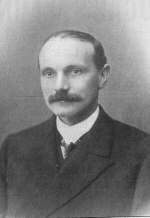 The Rev. Wm. Carr though a Lancashire man, is thoroughly at home
in the Isle of Man he having married a Manx lady. He underwent
training at Hartley College, and has been 15 years in the
Primitive Methodist ministry. His first term of ministerial
service in the Island was in Douglas, while he now superintends
the Laxey circuit. In Crewe and in Spen Valley be was prominent in
Free Church Council work. In regard to Insular religious
enterprise, he assisted in forming the I.O.M. Christian Endeavour
Union, of which he is now president. The successful P.S.A. at
Laxey (now in its third winter's work) has had Mr Carr's
leadership and presidency from the start; and his penchant in
regard to social conditions is shown by his recent appearance in
the Douglas courts - first in opposition to the grant of a new
liquor licence at Baldrine, and secondly in protesting against
compulsory vaccination.
The Rev. Wm. Carr though a Lancashire man, is thoroughly at home
in the Isle of Man he having married a Manx lady. He underwent
training at Hartley College, and has been 15 years in the
Primitive Methodist ministry. His first term of ministerial
service in the Island was in Douglas, while he now superintends
the Laxey circuit. In Crewe and in Spen Valley be was prominent in
Free Church Council work. In regard to Insular religious
enterprise, he assisted in forming the I.O.M. Christian Endeavour
Union, of which he is now president. The successful P.S.A. at
Laxey (now in its third winter's work) has had Mr Carr's
leadership and presidency from the start; and his penchant in
regard to social conditions is shown by his recent appearance in
the Douglas courts - first in opposition to the grant of a new
liquor licence at Baldrine, and secondly in protesting against
compulsory vaccination.
IoM Examiner Annual 1912 p45
A.W.Moore Manx Worthies 1900 [under Reformers]
John Christian, local preacher and leader of Douglas, Isle of Man, was born in K. K. Onchan, in the year 1808. He appears to have lived with his parents until he was put an apprentice to the trade of nail-making, at Douglas. He had a sister who was a member of our society, and noted for her zeal, through whose instrumentality, it is likely, he was brought to God; and, as a young active Christian, he began to attend all the prayer-meetings in the town, which he also did near his end. From brother B. Corkhill and others we learn,-
I. That his conduct was consistent.-Having fled to Christ, and found acceptance with God, he evinced to all around that he was "a new creature," standing firm in the liberty wherewith Christ hind made him free,., and showing to all the moral beauties of the religion of the Son of God. He stood before the world unconvicted of wrong.
II. He had zeal for the advancement of the Gospel.-To accomplish this object he laboured and travelled much as a local preacher for many years. He appeared free from that low idea which seems to say, "How little can I do and yet maintain my place? 'He was ever ready to do what he could in his own appointments, or as a supply for others. Of him it may truly be said, "He was diligent in business, fervent in spirit, serving the Lord." Hence, said a brother to me respecting his death, "We have lost one of our hardest working men."
III. His talents and usefulness as a preacher.-His talents, in the eyes of superficial people, were not of the first order; but his public efforts were free from affectation, full of zeal, earnest, and faithful, leading the people to diligence in the use of the means of grace, to keep alive the holy fire in their souls. He loved open-air meetings, as being well calculated to draw wanderers to the house of God. On one occasion he had a glorious manifestation of the presence and power of God, in 'the open air. Captain John Corlett accompanied him to Port-le-Murray, a distance of fifteen miles, and when they arrived the house was too small for the people, so they went to the pier by the new quay and sang a hymn. The round reached to the How, and the people came down the mountain in all directions, and the preacher and congregation from the Wesleyan chapel came in a body. Brother Corlett spoke first, and the seamen listened with great attention to his words. Brother Christian spoke next, and the power of God fell upon all present; there 'was a great breaking down among sinners, and believers were filled with joy. The time will long be remembered by the people in that neighbourhood.
IV. His affliction and death.-After being ill some time, it was thought advisable to take him into the country; therefore on September 15th my son took him to his brother's; but he became so much worse, that on the 17th I went for him, back. He was then so ill that I thought he would have died in. the conveyance. I asked him how he stood as to preparation for eternity. He said, "I am ready. From my first starting I have aimed at being ready, and now I feel all is right. All is right!" The same evening he said to brother Corlett, "All is right! all is right!" Brother Shipley was with him most of Sunday, and found him waiting in patience for his change. Brother Pritchard called about two o'clock on Sunday, and said to him, You are planned for Sluie Charn to-day." "Yes," said he, pointing upwards, and alluding to the meaning of "Sluie Charn," namely, "Mount of God," and about three o'clock on September 19th, 1852, he took his departure for his appointment on the "Mount of God" above, aged forty-four years. May we meet him in glory! Amen. S. Smith.
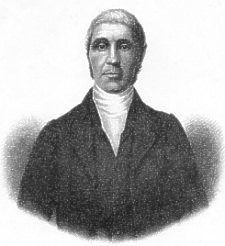 Stationed
on Island 1835/6
Stationed
on Island 1835/6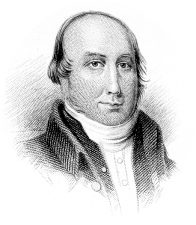
Cofounder with Hugh Bourne of Primitive Methodist Connexion. Born Burslem, 1780, father a potter to which trade he was apprenticed at age of 12 to his uncle Joseph Wedgewood (thus missed out on most of education hence his reluctance to express himself in writing); his mother was daughter of Aaron Wedgewood. In his own words spent a 'profligate youth' (though from given details does not sound at all evil). Converted in 1805; from which time travelled extensively as exhorter and LP. Following formation of PM connexion travelled unceasingly until his retirement.
Once visited Isle of Man.
See J T Wilkinson "William Clowes, 1780-1851" Epworth Press 1951
"Phil became the greatest Manx evangelist the Island has ever seen. Physically he was a man of great proportions, and his strength was equal he that of three ordinary men. He had a row of double teeth all round the lower jaw, a voice like the rolling of deep thunder. He could neither read nor write when he was converted, but had a good memory, and could easily remember portions of scripture and hymns which were read to him...".
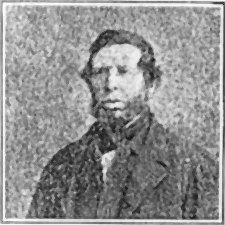 Mr.
John Corjeag , who was for 45 years a local preacher, died in the
Lord at Ballalona, Michael, in the Ramsey Circuit, Isle of Man.
His remains were interred in the parish burial ground on Monday,
September 1884, and was attended by about 50 persons, including
the vicar of the parish. Solemn and impressive services were held
in the Primitive Methodist Chapel, Michael, and at the graveside,
in which the Revs E. Tripp, J. Openshaw and H. Hatherley took
part. It is a long time since the Ramsey Circuit has been called
upon to yield to the demands of death an official who united so
many amiable and useful qualities, and one who was so deservedly
esteemed for his honourable character and work. Bro. Corjeag was a
reliable man in the cause, and his death leaves a gap not easily
filled up. He marched forward in the ranks of the sacramental
host, proving his soldiership in the hard work of every campaign
in which his church was engaged, and was never afraid of a tough
engagement with the enemy, whether in the open air or in the
sanctuary. In his case death had indeed lost its sting, and the
younger members of the society who visited him felt that
Christianity deprives death of all its terrors. After partaking of
the sacrament in his own house a few days before his death, he
said to the local preachers and others present, in a very
impressive manner, "Whatever you do stick. to the cause." And now
that with him the battle is fought and the victory is won, may we,
when our own work is finished, also leave behind us a fragrant
name. Then "Crowns and kingdoms may be won, but the Master's own
"Well done!' will be best."
Mr.
John Corjeag , who was for 45 years a local preacher, died in the
Lord at Ballalona, Michael, in the Ramsey Circuit, Isle of Man.
His remains were interred in the parish burial ground on Monday,
September 1884, and was attended by about 50 persons, including
the vicar of the parish. Solemn and impressive services were held
in the Primitive Methodist Chapel, Michael, and at the graveside,
in which the Revs E. Tripp, J. Openshaw and H. Hatherley took
part. It is a long time since the Ramsey Circuit has been called
upon to yield to the demands of death an official who united so
many amiable and useful qualities, and one who was so deservedly
esteemed for his honourable character and work. Bro. Corjeag was a
reliable man in the cause, and his death leaves a gap not easily
filled up. He marched forward in the ranks of the sacramental
host, proving his soldiership in the hard work of every campaign
in which his church was engaged, and was never afraid of a tough
engagement with the enemy, whether in the open air or in the
sanctuary. In his case death had indeed lost its sting, and the
younger members of the society who visited him felt that
Christianity deprives death of all its terrors. After partaking of
the sacrament in his own house a few days before his death, he
said to the local preachers and others present, in a very
impressive manner, "Whatever you do stick. to the cause." And now
that with him the battle is fought and the victory is won, may we,
when our own work is finished, also leave behind us a fragrant
name. Then "Crowns and kingdoms may be won, but the Master's own
"Well done!' will be best." Mr JOHN CORLETT, local preacher and town missionary, Douglas circuit. Isle of Man. My dear brother John was born at Peel, on this island, in December, 1813. When he was twenty-one he came with his parents to reside at Tromode, near Douglas, where, through the instrumentality of a good man, now in heaven, he was brought to a saving acquaintance with God. The divine change that was effected in his heart immediately became visible in his life. Reading, prayer, and praise were evidently his delight. He regularly read his Bible through three times a year; and having a good memory, he became well armed with "the sword of the Spirit,' by which he was enabled to fight the battles of the Lord.
His name soon appeared on our plan as a local preacher, in which capacity few have been more attentive to their duties, or more self-denying, he saw the importance and felt the responsibility of his office. Neither stormy weather, dark nights, nor long journeys could induce him to stay at home. As a preacher he was fervid, affectionate, faithful, and useful.
For seventeen rears he was a staunch teetotaler, and a bold advocate of total abstinence principles he had also the best interests of the rising generation deeply at heart, and was much delighted whenever he could spend an hour in the Sabbath-School.
After some years spent in the above manner, he made up his mind to go to sea. Now he became a. missionary indeed for in every port he entered he unfurled the bloodstained banner of the cross, and cried, " Behold the Lamb of God, which taketh away the sin of the world." In the Shetland Islands, on the coast of Scotland, and in Ireland, although in some places he met with much opposition, his labours were made a blessing to many souls.
For nine or ten years he sailed from port to port, and preached Christ m every place amid his love to the Saviour and to precious souls seemed to become more and more fervent. He earnestly desired to spend and be spent in the cause of his God. Many were the prayers that he offered to his heavenly Father to make him more useful; and in answer to prayer the Lord opened to him an extensive field of usefulness. He had resolved to abandon tlte sea, and shortly afterwards a town missionary was wanted in Douglas, and being considered by his friends and townsmen a proper person for the office, he entered this field of labour, feeling assured that God. would be with him. I find in his journal the following entry:
"September 30th, 1850. I this day commenced my labours as a town missionary in the name of the Lord, with my heart deeply impressed with the importance of the work; " and all who knew him could bear testimony to the correctness of this statement. Constrained by the lore of Christ, he laboured with all his might. Often was he found weeping with them that wept, and rejoicing with them that rejoiced. This was his boast : " The poor have the gospel preached to them," In him the poor have lost a friend, for he believed that giving to the poor was lending to the Lord.
He toiled on in the mission for about three years, when it became visible that his once robust frame was shattered by excessive labour. During the greater part of his last year's labour he was afflicted with a severe cough, and with indigestion; consequently his work became extremely difficult to him. But notwithstanding his declining health during the last year of his labour, he spent 1327 hours in the service of the mission. He distributed, chiefly among sailors and boatmen, 789 tracts; held 182 meetings in the Bethel, and in various other places; read 480 portions of Scripture to families and individuals, besides conversing daily on religious subjects with sailors and others on shipboard, on the quay, on the sands, and in the streets; and made 1580 visits, 709 of which were to the sick and dying. He laboured as one who knew the number of his days was short. He was confined to his house for many months, and bore his, affliction with exemplary patience and resignation, evincing the truth and excellency of the religion which he had taught to others.
Many precious, seasons have I had with him while speaking of death and eternity. On several occasions he said, "Oh, how I long to die and be with Christ! I am ready-oh yes, ready to go td Jesus." About a fortnight before his death he said to me, "Whither are you going to-day?" When I told him he said, "William, preach Christ, and tell poor sinners that Jesus died to save them: I always preached Christ, and now I am going to be with him. Yes, I -must die; I cannot live;" and clasping his hands, and lifting his eyes towards heaven, he exclaimed, "Glory, glory, glory be to God!" The Sunday following, when I called to see him, he said, " How are they getting on at Tromode?" I told him they were doing well. "Thank God-thank God for that," said he. He then inquired how they were going on at the village of O-. I told him they were very low. "Oh!" he said, "to think that I have spent so much labour there, and now there is little to be seen! but, bless God, I shall not lose my reward."
The next time I called to see him he said he had been preaching a sermon in bed that morning from "Every eye shall see Him:' "O William" said he, "what a day will that be when every eye shall see Him' His tent on speaking of that day until the room was filled with glory, and he could say nothing more than "Glory, glory be to God !" The last time brother Hill visited him, in answer to a question relative to the state of his mind, he said, "I am like a vessel lying at anchor waiting for the tide, and a propitious breeze to waft me into the desired haven. Oh, how I long to depart and be with my Saviour ! Come, Lord Jesus, and come quickly." The night before his death, being asked if Christ was precious, he replied, "Yes, don't you feel Him? Glory be to God." During the night he repeatedly said, " Come, Lord Jesus, come quickly." He would raise his eyes towards heaven and say, "Glory, glory be to God.!" He frequently waved his hand in token of victory; and at about one o'clock on Tuesday, August 28th, 1854, his happy spirit took its flight to the throne of God. He died in his forty-first year, leaving a widow and child to deplore their loss; but their loss is his infinite gain. WILLIAM CORLETT.
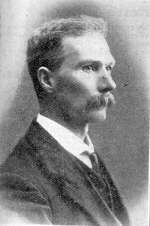 Mr. Craine holds the Position of District Chief Ruler in the
Rechabite Order. A
native of Lonan parish, he has been in business in Laxey for many
years. He is an active and reliable worker in every branch of work
carried on by the Primitive Methodist Church, with which he has
had a lifelong association. Also his position in Manx Rechabitism
is the reward of merit, a due recognition of faithful service in
the local tent, of which he is secretary. IoM Examiner Annual
1912 p43
Mr. Craine holds the Position of District Chief Ruler in the
Rechabite Order. A
native of Lonan parish, he has been in business in Laxey for many
years. He is an active and reliable worker in every branch of work
carried on by the Primitive Methodist Church, with which he has
had a lifelong association. Also his position in Manx Rechabitism
is the reward of merit, a due recognition of faithful service in
the local tent, of which he is secretary. IoM Examiner Annual
1912 p43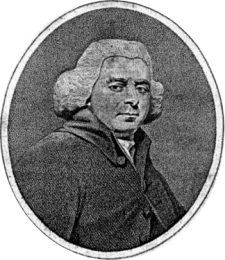 'The
Apostle to the Isle of Man' John Crook, saw little prospect of
doing good when he came over from the Liverpool district in 1775.
His Journal, March 1st, 1775, says "not a happy time; they think I
turn preacher for what I can get" He said the island was a nest of
smugglers but still he had some successes. Coming out of church in
Peel he caught the regular congregation and gave them another
sermon; and 'many were converted' of the four hundred he says
listened to him.
'The
Apostle to the Isle of Man' John Crook, saw little prospect of
doing good when he came over from the Liverpool district in 1775.
His Journal, March 1st, 1775, says "not a happy time; they think I
turn preacher for what I can get" He said the island was a nest of
smugglers but still he had some successes. Coming out of church in
Peel he caught the regular congregation and gave them another
sermon; and 'many were converted' of the four hundred he says
listened to him.He had some impact on Peel and when his first six months tour ended the Peel folk asked Wesley to return Crook to them. At the 1776 Conference he was accepted as a Travelling Preacher (minister) and sent to Whitehaven so that he had oversight of the island, and could 'easily' come to the island one month in-three! During 1776 he met with strong opposition. His meetings were broken up and Bishop Richmond sent a pastoral letter to his clergy warning against 'unqualified and unordained persons who presume to preach and set up conventicles.
Crook instituted the Manx Conference, based on Peel, and he personally examined all candidates for the local preachers' plan.
 Stationed
on Island; wrote Story of Primitive
Methodism on IoM published in 1906/7. Married daughter of
Thomas Kieg
Stationed
on Island; wrote Story of Primitive
Methodism on IoM published in 1906/7. Married daughter of
Thomas Kieg